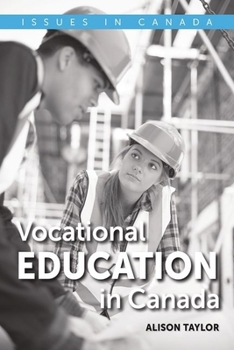Vocational Education in Canada
How best to educate youth for the world of work has long been a subject of discussion. In more recent times, the so-called phenomenon of "Baristas with B.A.," the "knowledge economy" and alarm over youth who are not in education, employment, or training ("NEETS") have been the focus of policy. The past decade has seen a flurry of reports, media opinions, and ongoing reform initiatives. Even so, debate and disagreement persists. Many reports, in fact, are contradictory; no clear picture of how reforms should be organized has emerged. Professor of sociology of education Alison Taylor has conducted much research into policies and practice related to vocational education and education reform. Taylor traces the history of vocational education in Canada and surveys more recent initiatives, considering how successful they have been and where weakness have arisen. Canada, she argues, inherited from the UK a strong "academic/vocational" division in curriculum, which serves no students well. While the German VET system, known to have stronger support for student transitions, warrants consideration, the context is quite different from that of Canada. Behind questions such as how education should respond to labour market demands, which skills, and what level of skills is needed Taylor sees deeper issues. Such issues include the following: What knowledge is the most valuable, who has access to it, and what agendas are fuelling the debate? Education and employment are unlikely to intersect in a straightforward manner, but there are important linkages to be made. Taylor argues for a rich and deep vocational education for youth, which prepares and equips them for working life by exploring the interconnections between practical and theoretical knowledge. Such a connective learning approach would help students develop concepts, ideas and skills that can be generalized across settings and would help youth adapt to changing circumstances by encouraging lifelong learning. The connective approach aligns well with a critical pedagogy of work experience, whereby students are provided with the knowledge, skills, and abilities needed to both understand and participate in the political dynamics of the changing workplace. Drawing on the latest research from a range of reports and other sources of data, Taylor contributes to the discussion about preparing youth for work by considering the expectations placed on schools, how schools have responded to these expectations over time, and how they should respond in the future.
Format:Paperback
Language:English
ISBN:0199009988
ISBN13:9780199009985
Release Date:May 2016
Publisher:Oxford University Press, USA
Length:176 Pages
Weight:0.50 lbs.
Dimensions:0.4" x 6.0" x 8.9"
Customer Reviews
0 rating





